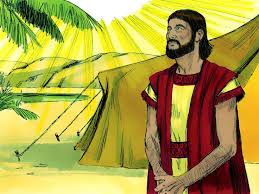Joshua 19:1 – The second lot came out for Simeon, for the tribe of the people of Simeon, according to their clans, and their inheritance was in the midst of the inheritance of the people of Judah. And they had for their inheritance Beersheba, Sheba, Moladah, Haar-shuel, Balah, Ezem,� together with all the villages around these cities as far as Baalath-beer, Ramah of the Negeb. This was the inheritance of the tribe of the people of Simeon according to their clans.

In chapter 18, Joshua gave instructions for the remaining land to be divided into lots by representatives of the seven remaining tribes. This new division said very little about the actual terrain of the land. Instead, it focused almost entirely on the cities and towns that were to be inherited by each of the remaining tribes.
Those particular cities are listed in great detail here in chapter 19. However, because we are not studying the locations of each city, I have not included the names of each one in this post; the text has been abbreviated by me. If you are interested in all of the specific names of the towns, you will need to read each verse in your own bible.
Once the new surveys were completed, they were submitted to Joshua. Benjamin was the first of the seven to receive an allotment (chapter 18) and now in chapter 19 we find a record of the remaining assignments.
THE SECOND LOT FELL TO SIMEON
His lot is perhaps the most interesting of the remaining seven.
In Genesis 34, we have a rather gruesome record of an event involving the children of Jacob. As Israel and his family were living in the land, many of the native people wanted to intermarry with them. However, if Israel's family intermarried with the other people in the land, they would soon cease to exist as a distinct nation. This was one reason why God strictly instructed Israel that his family was NOT to intermarry with the other nations.
Deuteronomy 7:3 - Neither shall you make marriages with them; your daughter you shall not give unto his son, nor his daughter shall you take unto your son.
At some point Dinah, one of the daughters of Jacob, was out and about when she was seen by Shechem, who was a prince (a man of the highest rank) of the Hivites. Shechem was instantly attracted to Dinah. He seized her, took her to his house and had sexual relations with her.

Afterwards, Shechem and his father Hamor went to see Jacob. They begged for Jacob to allow Dinah to marry Shechem. Shechem volunteered to pay any price they would name, no matter how large, in order to marry the girl.
When Simeon and Levi returned from working in the fields and found out what happened, there were livid! However, they held their peace and instead deceitfully convinced the house of Hamor that Dinah could marry Shechem on one condition – if all the men of their great city would agree to be circumcised.
In fact, they went so far as to say that if the Hivites would agree to this, then they could freely intermarry with the children of Jacob.
Hamor and Shechem return to their city and convince the men of the city to become circumcised. This is where the ulterior motive of the Hivites came to light. They wanted to intermarry with the Israelites because they were blessed and extremely wealthy; they planned to assimilate all of Israel's wealth into their own nation:
Genesis 34:23 – Will not their [Israel's] livestock, their property and all their beasts be ours? Only let us agree with them, and they will dwell with us.
So the Shechemites were circumcised. But on the third day afterward, when they were at their weakest point, Simeon and Levi went into the city and easily killed every single male.
They then plundered the city, taking everything the Hivites owned including their women and children. (Please take five minutes and read the account for yourself in Genesis 34.) However, their massacre of innocent people did not go unnoticed.
Now, let's fast-forward a good many years. When Jacob is on his deathbed, he prophesies over each of his sons. This is part of what he says about Simeon and Levi:
Genesis 49:7 – Cursed by their [Simeon and Levi] anger, for it is fierce, and their wrath, for it is cruel! I will divide them in Jacob and scatter them in Israel.
In other words, the descendants of Simeon and Levi were destined to be scattered among the other tribes as punishment for their violent revenge on the Shechemites.
We see the fulfillment of this prophesy in the division of the land. Levi will indeed be scattered in Israel because the Levites do not receive an allotment of land; they receive individual cities scattered throughout Israel. We will discuss this more fully in the next chapter. For now, let's examine the inheritance of Simeon.
Joshua 19:9 – The inheritance of the people of Simeon formed part of the territory of the people of Judah. Because the portion of the people of Judah was too large for them, the people of Simeon obtained an inheritance in the midst of their inheritance.
As you recall, Judah was the very first tribe to receive an inheritance. However, it was eventually discovered that their allotment was much too big. They literally did not have enough people to inhabit the cities and utilize the land. For this reason, some of their land/cities were going to be given to other tribes.
Here we find that all of the cities given to Simeon were originally deeded to Judah. In fact, their entire inheritance was actually inside the borders of Judah. (Unfortunately, the map we are currently using does not reflect this; but if you look at other sources, you will see Simeon completely within the borders of Judah).
Thus, Simeon was scattered within the borders of Judah, with what could scarcely be called their own lot. They were divided from the tribes they had been united with during the wilderness wanderings (Reuben and Gad). Indeed, it could be argued that they were divided from all the tribes, since they were 'encased' in the tribe of Judah.
Eventually, as time went on, the people of Simeon were assimilated into the tribe of Judah.
Joshua 19:10-16 – The third lot came up for the people of Zebulun, according to their clans. And the territory of their inheritance reached as far as Sarid. Then their boundary goes up westward and on to Mareal and touches Dabbesheth, then the brook that is east of Jokneam. From Sarid it goes in the other direction eastward toward the sunrise to the to the boundary of Chisloth-tabor... This is the inheritance of the people of Zebulun, according to their clans – these cities and their villages.
THE THIRD LOT FELL TO ZEBULUN
The original allotment of Zebulun consisted of a mere twelve cities. This would certainly not have been an adequate amount of territory for a tribe which exceeded sixty-thousand people (Numbers 26:27). This leads us to one of two conclusions:

- The surveyors submitted a map to Joshua which displayed the entire territory of Zebulun, while only listing the major/largest cities in the allotment. Since the map did not travel down through history, we are left with only the names of major cities.
- The surveyors submitted an exhaustive list of cities to Joshua, but the historian who recorded the allotments in scripture chose to limit the information included in our text.
Regardless of what actually occurred, we find that the initial territory of Zebulun did not actually touch any bodies of water. Yet, later in the history of Israel, we can confirm that their borders reached the Sea of Galilee (Matthew 4:13-5), where they undoubtedly reaped many benefits from fishing and trading, as predicted by their father Jacob:
Genesis 49:13 – Zebulun shall dwell at the shore of the sea; he shall become a haven for ships, and his border shall be at Sidon.
Scholars debate whether or not the people of Zebulun ever extended their territory to the seacoast of the Mediterranean. Sidon, or Zidon, is an actual city but the name is also used to refer to the general location of the Phoenicians, who were experts in sailing and trade (the Phoenicians were the Amazon trading company of that day).
The prophesy of Jacob may simply indicate that the territory of Zebulun was close enough to the Phoenicians that they enjoyed extensive and profitable commerce with them, even though their actual border did not touch the Mediterranean Sea.
The territory of Zebulun included:
- The later city of Nazareth, where Jesus spent his childhood.
- Mount Tabor, where Jesus was transfigured.
- The coasts of the Sea of Galilee, where many of the miracles and ministry of Jesus occurred.
Joshua 19:17-23 – The fourth lot came out for Issachar, for the people of Issachar, according to their clans. Their territory included Jezreel and Beth-shemesh, and its boundary ends at the Jordan – sixteen cities with their villages. This is the inheritance of the tribe of the people of Issachar, according to their clans – the cities with their villages.
THE FOURTH LOT FELL TO ISSACHAR
Sixteen cities were allotted to the children of Issachar. Two notable leaders came from this tribe:
- Tola, one of the great judges of Israel, was from this tribe (Judges 10:1).
- Baasha, one of the kings of Israel was also from this tribe (I Kings 15:27).
In addition, a lot of notable historical events took place within Zebulun's borders:
- Jezreel – This was the location of the palace of the wicked king Ahab and his wife, Jezebel. It was here that the royal couple plotted to kill Naboth, so they could steal his vineyard (I Kings 21).
- Shunem – Elisha spent a lot of time here; consequently the woman of Shuneum and her husband built a tiny apartment for him on top of their house. At some point, Elisha raised their son from the dead (II Kings 4).
- Kishon River – This was the location of the victory of Deborah and Barak over Sisera, the commander of King Jabin's army (Judges 4).
- Mountains of Gilboa – This was the place where King Saul and his son Jonathan were slain in battle. The site was not very far from Endor, where Saul consulted the witch (I Samuel 28:4, I Samuel 31).
- Valley of Megiddo – This was the place where king Josiah was slain in a battle with the king of Egypt (II Kings 23:8-30).
Joshua 19:24-31 – The fifth lot came out for the tribe of the people of Asher according to their clans. Their territory included Helkath, Hali�Ummah, Aphek and Rehob – twenty-two cities with their villages. This is the inheritance of the tribe of the people of Asher according to their clans – these cities with their villages.
THE FIFTH LOT FELL TO ASHER
The allotment of Asher was long and narrow with the Mediterranean Sea being its western border. Its land has been described as pleasant and fruitful.

The scriptures do not record any particularly famous people or leaders coming from this tribe, other than the prophetess Anna who identified Jesus as the Messiah when he was being dedicated in the temple (Luke 2:36-38).
This tribe was right next to the two famous maritime cities of Tyre and Sidon, but there is no indication that the people of Asher took advantage of the opportunities this afforded them.
Joshua 19:32-39 – The sixth lot came out for the people of Naphtali, for the people of Naphtali, according to their clans. And their boundary ran from Heleph, from the oak in Zaanannim. Horem, Beth-anath, and Beth-shemeth – nineteen cities with their villages. This is the inheritance of the tribe of the people of Naphtali according to their clans – the cities with their villages.
THE SIXTH LOT FELL TO NAPHTALI
The western border of Naphtali was the tribe of Asher, while its eastern border was the Jordan River and the Sea of Galilee.
Naphtali means 'struggle' or 'fight' and this seems to describe the men of this tribe very well.
- Ten-thousand men from Naphtali responded to the call of Barak in the victory against Sisera. The warriors of this tribe distinguished themselves for their bravery in battle (Judges 5:18).
- The tribe of Naphtali provided 1000 army captains and 37,000 men with shields and spears to assist David in taking the kingdom from the house of Saul (I Chronicles 12:34).
But despite all this bravery, they failed to drive the Canaanites out of their territory. As a result, the land around Galilee eventually became known as Galilee of the Gentiles (Matthew 4:15). It was in this region that Jesus began to preach the gospel after John the Baptist was thrown into prison (Matthew 4:12-17).
Joshua 19:40-46 – The seventh lot came out for the tribe of the people of Dan according to their clans. And the territory of its inheritance included Zorah, Eshtaol, Ir-shemesh and Rakkon with the territory over against Joppa.
THE SEVENTH AND FINAL ALLOTMENT FELL TO DAN
The allotment of Dan was to the west of Benjamin. It consisted of land given up by both Judah (some of its northern cities/towns) and Ephraim (its southern cities/towns). The exact boundaries are not given, because they can be located by examining the adjoining territories.
Their allotment included a mountainous region and a lot of very fertile ground at the base of the mountain range. But sadly, they didn't get to enjoy much of it. This tribe was vexed by the Amorites, who forced them up into the mountains and took their best land (Judges 1:34).
Dan was also smitten by the Philistines on a regular basis. Because of this, the Lord raised up Sampson to give the Danites relief (Judges 13-16).
Joshua 19:47-48 – When the territory of the people of Dan was lost to them, the people of Dan went up and fought against Leshem, and after capturing it and striking it with the sword they took possession of it and settled in it, calling Leshem, Dan, after the name of Dan their ancestor. This is the inheritance of the tribe of the people of Dan, according to their clans – these cities with their villages.
At a later date (after the death of Joshua), the Danites found themselves out of room for their growing population. This was due to the fact that the Amorites were in their territory. However, instead of taking them head on, they opted to fight against the city and region of Leshem which was controlled by the Sidonions.
They won this war, annexed the city and its lands to their tribe, and renamed the city Dan. You can read the account of this battle in Judges chapter 18.
Dan became the most important city in the northern part of Israel. Beersheba was the southern most major city. Hence, we often come across the scriptural phrase 'from Dan to Beersheba', which signifies the entirety of the Promised Land from north to south.
Joshua 19:49-50 – When they had finished distributing the several territories of the land as inheritances, the people of Israel gave an inheritance among them to Joshua the son of Nun. By command of the Lord they gave him the city that he asked for, Timnath-serah in the hill country of Ephraim. And he rebuilt the city and settled in it.
All the tribes have now received their allotment. Caleb has been granted the right to conquer and possess Hebron. The daughters of Zelophehad had received their share of inheritance from their father. At this point, there is one final footnote to the division of the land – a special inheritance for Joshua.
We note that his inheritance was given to him 'by the command of the Lord'. The inference is that God promised Joshua a specific city way back in the day, just as he had promised Caleb the city of Hebron (Joshua 14:6).

However, because of his humility, Joshua did not seek to possess his inheritance until every other person had received theirs. He was literally the last one to claim his inheritance, which reflects his modesty and devotion to God.
Joshua requested to have the city of Timnath-serah (or Timnath-heres) which was located on Mount Gaash, within the allotment of his own tribe (Ephraim). Scripture tells us that this city had to be rebuilt before it was inhabited. This is further evidence that Joshua did not seek the best of the land for himself. It also indicates that he did not presume to think that the rest of the nation 'owed him' something; he did not expect others to repair or rebuild the city for him.
One commentator has expressed an interesting opinion on the inheritance of Joshua:
Not all riches comfort us. Ill-gotten riches curse us. Riches earned by others and simply passed on to us are insipid. Wealth obtained by penury (being miserly) is a burden. But the riches that come as a reward of diligence and honor have a special sweetness, and the man who acquires them has a special power of enjoying them.
This must surely have been true of Joshua!
Joshua 19:51 – These are the inheritances that Eleazar the priest and Joshua the son of Nun and the heads of the fathers' houses of the tribes of the people of Israel distributed by lot at Shiloh before the Lord, at the entrance of the tent of meeting. So they finished dividing up the land.
This verse represents the formal close or finish of the history of the division of the land. It is stamped with the names of the leaders (Joshua and Eleazar) as well as the place where the casting of the lots took place.
Because all of this was done in the presence of the Lord, the division was final; there could be no complaining and no appeals would be entertained.
Let me offer you some encouragement:
One thing that becomes apparent in today's post is that God is always faithful to his promises. Way back when Abraham was alive, God promised to give Israel their own land.
Genesis 12:7 - And the LORD appeared unto Abram, and said, Unto your descendants will I give this land: and there built he an altar unto the LORD, who appeared unto him.
It took multiple generations until the promise came to pass, but it did come to pass.
When Israel turned away from God and served idols, God called on the people to repent or else he would exile them from the land. They had many, many years in which to repent, but they refused. Sure enough, God was faithful to his word and Israel was taken into exile (II Kings 24 and 25).
But in his great mercy, God promised to once again bring them into the land, which he did through Cyrus, king of Persia. The point is that God is always faithful to his promises.
God has made many promises to the church.
He promised that the gates of hell will not prevail against us. He promised us the Holy Spirit and all of his power. He promised that when he opens a door no man can shut it and when he closes a door no man can open it. He promised us a crown of life. He promised to prepare a place for us in his eternal kingdom. He promised to be with us until the end of the age.
So be encouraged today – the battle may seem long and protracted, but God will continue to be faithful to his word!
Let me offer you some relief:
There is another apparent truth in today's text – Israel was repeatedly unfaithful to God and often exhibited unbelief. This was very evident by the fact that not one single tribe fully drove the Canaanites out of their inheritance.
And truthfully, we are not so different. Despite the promises of God we too often exhibit unbelief and a lack of faith. Many of us have 'giants' living within the borders of our own lives.
But here is some good news that bears repeating – every single time Israel repented and turned back to the Lord, he forgave them. He once again renewed his relationship with them and was ready and willing to give them victory over their enemies.
Psalm 103:10-11 - He [God] has not dealt with us according to our sins; nor rewarded us according to our iniquities. For as the heaven is high above the earth, so great is his mercy toward them that fear him.
God has not changed; his great love and mercy are still the same today! Just as he was patient with Israel, he is patient with us today. If you need to repent for your unbelief, do it now, because God is waiting for you to turn toward him, so he can assist you in obtaining victory!
Let me offer you some strength:
You may have a 'giant' within the boundaries of your life, and it may look like there is no way to gain victory over it. But that's not true – with God, all things are possible. Even if you've been defeated in some area of your life in the past, there is still hope for the future. So don't give up on the promises of God!
Stand strong in your faith. Continue to fight the battle on your knees in prayer. Speak the promises of God over your situation; open your mouth and testify about the deliverance of God and watch those promises come to fruition in your life!
